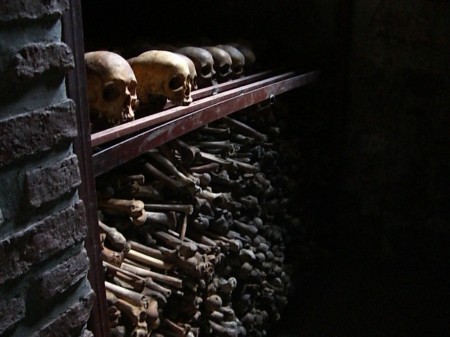
Could it be that sometimes historical truth and political gain really do go hand-in-hand? It appears so for Rwandan President Paul Kagame.
A Rwandan investigative committee has just issued a massive new report on the 1994 assassination of President Juvenal Habyarimana – a murder that sparked the genocide of nearly one million Tutsis and moderate Hutus in the hellish hundred days that followed.
Drawing on extensive research and nearly 600 interviews, the report concludes that Hutu extremists in Habyariman’s own government took him out to curtail the power-sharing peace agreement he was about to implement with Kagame’s Tutsi-led Rwandan Patriotic Front (RPF).
Habyarimana’s plane was shot down in his own backyard on the fateful night of 6 April 1994 by a pair of surface-to-air missiles. The role of the plane crash in launching the small central African country into a swift and shocking spiral of violence has been well documented. The question of ‘who done it?’, however, has remained in dispute.
In fact, Kagame and some of his closest associates have long been suspected of downing the plane. In 2006, the International Criminal Tribunal for Rwanda launched an investigation into RFP responsibility for the attack – but Kagame successfully shut it down. The following year, nine of Kagame’s closest political allies were indicted by a French judge on terrorism charges for plotting the destruction of Habyarimana’s plane. Kagame responded by immediately severing all diplomatic ties with France and launching an investigation of his own into the crash. The new Mutsinzi report is the outcome.
Obviously, the report serves Kagame’s political interests well, exonerating his Tutsi government of any culpability in the assassination that launched a genocide.
Too good to be true?
Surely, politically expedient historical ‘truths’ unearthed by state-sponsored commissions should give us all pause. After all, there have been a long line of government ‘truth’ commissions designed to prop-up the very state structures they portend to investigate. (Check out our recent ISN Special Report, ‘The Truth about Truth Commissions,’ for an in-depth examination of its latest propagandizing incarnation in a resurgent Russia.)
So is it just too good (for Kagame and crew) to be true?
Not necessarily. Philip Gourevitch, author of a book on the genocide, praised the Mutsinzi report as an “extraordinary historical and political document” in a recent New Yorker blog post.
And he isn’t alone. The report’s findings helped lay the groundwork for the resumption of diplomatic relations between Kigali and Paris. Even the French press has jumped on its bandwagon.
Despite the accolades, competing historical narratives will remain. “I don’t think it (the report) will convince many of Kagame’s skeptics or most of his critics,” Jennifer Cooke, director of CSIS’ Africa program, told The Washington Post, arguing that “perception is also as important as fact in this kind of case.”
Gourevitch agrees that the report is surely not “the last word on Habyarimana’s assassination or the events that surrounded it” but concludes that “it marks a dramatic change in the way that Rwanda officially confronts its own history.”
It also demonstrates that Kagame’s government has achieved “a level of sophistication, skill and effectiveness in commanding international respect that has rarely, if ever, been seen before in Africa.”
Perhaps, then, there is one fact on which all sides can agree: The Mutsinzi report is nothing short of a political and diplomatic coup for Kagame.

